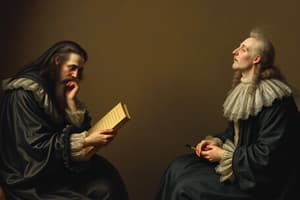Podcast
Questions and Answers
Which of the following is a key characteristic of Romantic poetry?
Which of the following is a key characteristic of Romantic poetry?
- Expressing concerns about social transformations
- Embracing traditional poetic structures
- Emphasizing authentic human experiences and emotions (correct)
- Focusing on scientific advancements
Which of these poets is associated with the Victorian era of British poetry?
Which of these poets is associated with the Victorian era of British poetry?
- William Blake
- Alfred Tennyson (correct)
- John Keats
- T.S. Eliot
What was the primary focus of Romantic poets when writing their poetry?
What was the primary focus of Romantic poets when writing their poetry?
- Exploring themes of liberty, exoticism, and the supernatural (correct)
- Depicting the rapid industrialization of British society
- Adhering to traditional poetic forms and structures
- Addressing the scientific advancements of the Victorian era
Which of the following is a characteristic of Modern British poetry?
Which of the following is a characteristic of Modern British poetry?
How did Victorian poetry differ from Romantic poetry?
How did Victorian poetry differ from Romantic poetry?
Which poetic form is most closely associated with the Romantic era in British poetry?
Which poetic form is most closely associated with the Romantic era in British poetry?
Who are some major poets associated with Victorian poetry?
Who are some major poets associated with Victorian poetry?
What was a key focus of modern poetry in the 20th century?
What was a key focus of modern poetry in the 20th century?
Which poetic form is known for its strict structure and often consists of 14 lines?
Which poetic form is known for its strict structure and often consists of 14 lines?
In what way did modern poets differ from their predecessors in terms of language use?
In what way did modern poets differ from their predecessors in terms of language use?
Which poet(s) belong to the Romantic period in British poetry?
Which poet(s) belong to the Romantic period in British poetry?
What is a common goal among British poets regardless of the poetic form used?
What is a common goal among British poets regardless of the poetic form used?
Flashcards are hidden until you start studying
Study Notes
British Poetry: From Romantic to Victorian, Modern Times
British poetry, much like the nation itself, has been shaped by a diverse range of historical periods and influences. From the rebellious spirit of Romantic poetry to the societal shifts marked by Victorian verse, to the experimental and groundbreaking trends of Modern poetry, each era has contributed unique perspectives and poetic forms to the rich tapestry of British literary heritage.
Romantic Poetry
Marked by its rejection of the traditional poetic structures prevalent during the Enlightenment, Romantic poetry embraced the imagination and individualism, with a strong emphasis on authentic human experiences and emotions. Key figures of this era include William Blake, Percy Bysshe Shelley, John Keats, Samuel Taylor Coleridge, and Lord Byron. Romantic poets sought to create an emotional connection with their readers, often drawing inspiration from nature and exploring themes such as liberty, exoticism, and the supernatural.
Victorian Poetry
As the Victorian era dawned, poetry reflected the significant social transformations occurring within British society. With the end of the Romantic period and the rise of Queen Victoria, the country experienced rapid industrialization and scientific advancements. Victorian poets expressed concerns about the changing world around them, often employing sensory imagery to explore complex issues such as religion, science, nature, romance, and the past. Some notable poets of this time were Matthew Arnold, Robert Browning, and Alfred, Lord Tennyson.
Modern Poetry
With the advent of the 20th century, British poetry continued to evolve, embracing experimentation and new modes of expression. Modern poetry moved away from traditional themes and forms, instead focusing on the complexities of urban life, individual experiences, and the human condition. Key modern poets include W.H. Auden, Ted Hughes, Philip Larkin, and Sylvia Plath. Their works often featured free verse and colloquial language, deviating from the strictures of earlier poetic traditions.
Poetic Forms
Throughout history, British poets have explored a variety of poetic forms to express their ideas and emotions. These include traditional structures like sonnets and haikus, as well as more modern inventions such as free verse and collage poetry. Regardless of form, the goal has always been to engage the reader and offer fresh insights into the human experience.
Major British Poets
From the Romantic rebels to the Victorian observers, and onto the avant-garde voices of the modern era, British poetry has been shaped by countless talented poets. Each figure has contributed to the ongoing dialogue about life, love, nature, politics, and the human condition, ensuring that British poetry continues to resonate with readers across generations.
Studying That Suits You
Use AI to generate personalized quizzes and flashcards to suit your learning preferences.




